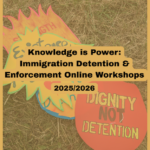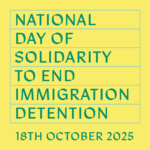
In the UK, a return is the process where someone who is in the UK without the right to remain is required by the Home Office to leave the country, often ‘voluntarily’. This can happen when a person has overstayed their visa, been refused asylum, or is found to be in breach of immigration laws.
A return is different from deportation or removal because it usually involves the person leaving the UK of their own accord or with less enforcement, and it may include some financial or travel support from the Home Office to facilitate the departure.
While returning can be a voluntary departure, deportation and removal generally refer to enforced departures, with deportation usually being a more serious action involving a legal ban on re-entry.
It is important to be aware of the different types of return, as the Labour government has proudly boasted about a ‘massive surge’ in returns since winning the General Election last July.
The different types of returns
Voluntary return: When someone who is in the UK and does not have leave to remain leaves to their country of origin of their ‘own’ accord. They may be able to engage with the Home Office’s Voluntary Returns Service (VRS).
Assisted return: A programme that facilitates, for people who do not have permission to stay in the UK, a return to their home country. The Home Office may provide financial support of up to £3,000 to help with ‘reintegration’. This support can be used to find a job, start a business, or find a place to live in their home country. However, there is usually a re-entry ban that prevents people from returning to the UK for a period of time. The length of the ban depends on the person’s immigration record and how much support they received from the Home Office.
The main difference between a voluntary return and an assisted return in the UK is that an assisted return involves the Home Office providing additional support, e.g.
- A re-integration package of £1,000–£2,000
- Financial support for reintegration costs, such as £3,000 for those departing to a developing country
- Help with travel documents, such as arranging a one-way travel document
- A caseworker to provide support through the process
Enforced return: An enforced return is when the Home Office removes a person from the UK who does not have a legal right to stay. The Home Office enforces returns when a person declines to leave voluntarily.
Removal: If you do not have leave to remain in the UK (this means permission to stay, or a visa), you may be at risk of removal from the UK by the Home Office. You may hear this referred to as ‘forced’ or ‘administrative’ removal.
Deportation: If you have been convicted of a criminal offence and you are not a British citizen, you may be at risk of deportation from the UK. People often use the word deportation to mean any forced removal, but in the UK deportation has a specific legal meaning. It is the enforced removal of someone, usually after serving a criminal sentence, for what the UK Home Office calls the ‘public good’.
Return agreements
A research briefing in the House of Commons Library explains that the government has at least 16 formal returns agreements with other countries.
The UK has agreements with some countries for the return of people lacking legal residence. These agreements take various forms and are not usually published.
The attached briefing lists known agreements and links to the text where available. The government has confirmed the existence of some form of agreement with 24 countries since 2021, some recent and some struck up to 20 years ago:
- In 2021, the government confirmed that it has formal returns agreements with Afghanistan, Algeria, Angola, Azerbaijan, China, Djibouti, Democratic Republic of Congo, Guinea, Iraq, Kuwait, Nigeria, Sierra Leone, Somalia, South Korea, South Sudan, Switzerland and Vietnam. That accounts for 16 countries, excluding the deal with Afghanistan because it has been inoperable in practice since regime change later in 2021.
- Since 2021, the government has signed formal returns agreements with Albania, Georgia, Serbia, Moldova and Pakistan. These five replaced European Union agreements with those countries in which the UK took part while an EU member.
- In 2021, the UK and India agreed a migration and mobility partnership that included provisions on returns.
- In 2024, the UK and Bangladesh announced an informal returns agreement described as standard operating procedures.
- In 2020, the UK and Ireland set up an informal returns agreement covering asylum seekers (rather than British or Irish citizens), described as non-legally binding operational arrangements.
There may well be other informal or even formal agreements, the existence of which has not been disclosed. The arrangement with Ireland was not announced at the time and only came to public attention in 2024.
Agreements made in the form of a treaty are published and laid before Parliament, but the government is not required to publish a memorandum of understanding or operational protocol. It has refused, for example, to disclose the contents of the 2022 Pakistan agreement.
As you know, at Right to Remain, we have been focused on enforcement (creating resources and increasing our communities’ capacity to respond to it) particularly since the Labour government came into power.
We have been hearing snippets of information about the occurrence of voluntary returns and family returns, but would like to learn more about how this is happening in practice so as to further inform our communities.
If you yourself or your service users have been offered a return by the Home Office, or who have been invited to return interviews (for voluntary / family returns or otherwise), or have indeed returned, please do get in touch by emailing contact@righttoremain.org.uk.
Please note that we do not provide legal advice or representation, and will not be able to respond to personal legal advice queries.












Discussion: